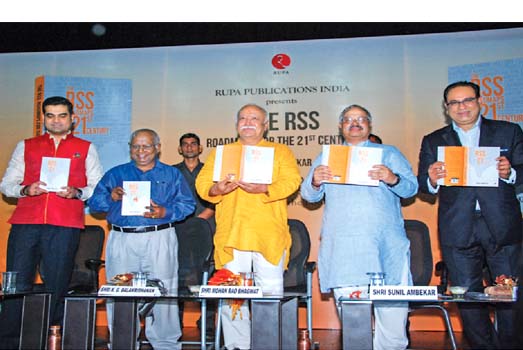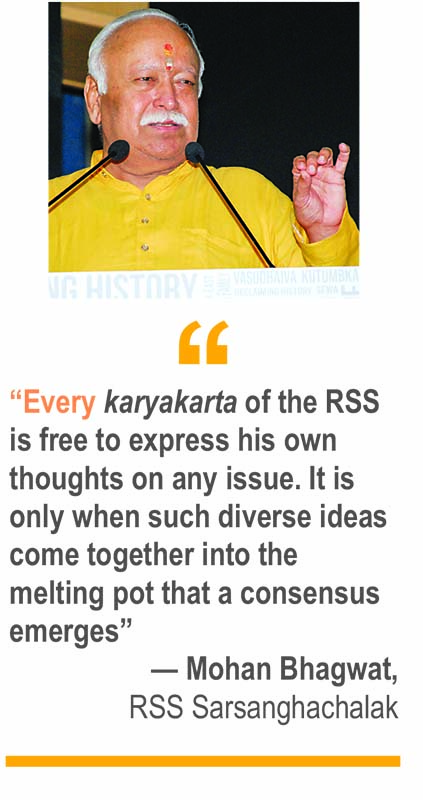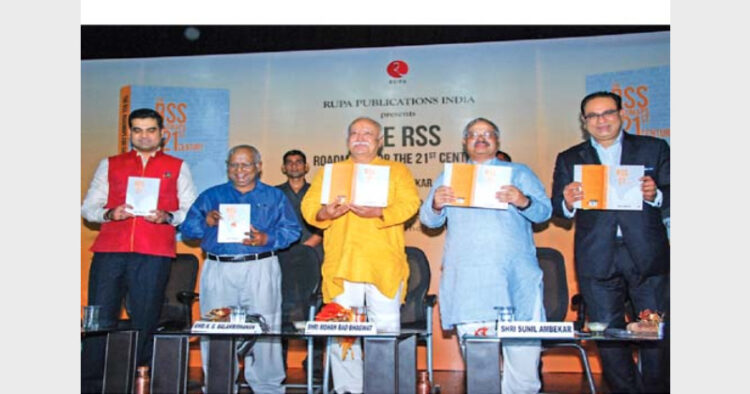
From left Shri Kapish Mehra, Justice Shri KG Balakrishnan,
Shri Mohan Bhagwat, Shri Sunil Ambekar and Shri Sandip Somany releasing the book in New Delhi
Shri Mohan Bhagwat, Shri Sunil Ambekar and Shri Sandip Somany releasing the book in New Delhi
‘The RSS: A Roadmaps for the 21st Century’ by ABVP organising secretary Shri Sunil Ambekar addresses multiple issues related to the Rashtriya Swayamsevak Sangh
New Delhi: “Merely a change in the system is not the guarantee of the desired change in the society. It requires a change in the mindset and conduct of the individuals. The Sangh has been trying to bring about such a change in society for the last over 90 years. The Sangh never thinks that it will change everything. We believe that all people should work together for the desired change,” said RSS Sarsanghachalak Shri Mohan Bhagwat while releasing a book, ‘The RSS: A Roadmaps for the 21st Century’, on October 1, 2019. The book, published by Rupa Publications India has been written by national organising secretary of Akhil Bharatiya Vidyarthi Parishad Shri Sunil Ambekar.
Former Chief Justice of India Shri KG Balakrishnan and chairman of FICCI Shri Sandip Somany were also present. RSS Sahsarkaryavah Shri Dattatreya Hosabale, Akhil Bharatiya Prachar Pramukh Shri Arun Kumar, various union ministers including Shri Nitin Gadkari, Shri Prakash Javadekar, Smt Smriti Irani, Shri Dharmendra Pradhan, Shri Piyush Goel, Shri Prahlad Singh Patel, Shri Arjun Ram Meghwal and scores of eminent people from various walks of life were also present at the jam-packed Ambedkar International Centre’s Bhim Auditorium.

The Sarsanghachalak called upon the people to join any of the Sangh activity for two years to know the RSS. “The Sangh cannot be limited to any book or ideology. Before making an opinion about the RSS come and join any of its activity for two and a half years and then know what the Sangh is and what it does,” he said. He said every karyakarta of the RSS is free to express his own thoughts on any issue. It is only when such diverse ideas come together into the melting pot that a consensus emerges. The roadmap, which the book by Shri Sunil Ambekar talks about, is nothing but a sum of such consensuses. There are no attempts to either straightjacket individual thoughts within the Sangh. There are no Sangh ideologues. The ideas pervading the society are synonymous with the ideas propounded by the Sangh. The only constant undertone in Sangh’s line of thought is that Bharat is a Hindu Rashtra. Everything else is amenable to change within this broad framework.
He said the book by Shri Ambekar is in English but some thoughts and lived experiences in the Sangh have exclusive Indian context and cannot be condensed into pithy phrases of a foreign language. “The Sangh believes in social harmony, harmony between one’s responsibility towards one’s family and responsibility towards the nation. Even Dr. Hedgewar and Shri Guruji never claimed to understand the Sangh in its entirety. I too have started understanding it too some extent. Shri Dattopant Thengadi sought to explain Sangh’s skeletal structure by borrowing heavily from the Bhagwad Gita. But Shri Sunil Ambekar has managed to touch upon many aspects of the Sangh’s interaction with the society,” he added.
Shri Bhagwat said the Sangh has been changing with the time. “Dr. Hedgewar seldom spoke about environmental issues, whereas the Sangh today is fully committed to sensitising the society towards restoring the ecological balance. This is a testament to the responsiveness of the Sangh towards the changing needs of society. We don’t subscribe to any rigid ideology. We have a vision resulting from our collective and lived experiences. The Sangh’s objective is to unify society. Social unity will lead to a unified response to any threat, and subsequently to national regeneration. Dialogue and not debate is the Indian way of reaching a consensus. No book, including the ‘Bunch of Thoughts’ can provide a comprehensive view of what the Sangh stands for. If one wants to truly understand the Sangh, then one must look into and take inspiration from the lives of Shivaji Maharaj and Guru Golwalkar. The book by Shri Ambekar does provide an insightful outline of the Sangh’s history and its social purpose. Everyone who wants a preliminary understanding of the Sangh should read this book, he added.
Justice Shri K.G. Balakrishnan specifically mentioned Chapter 5 of the book, which talks about caste inequality. “Shri Ambekar has done an analytical study of the caste system and its transformation into an exclusionary social structure. He has also given the history of caste system. Many former Sarsanghchalaks have made eradication of caste-based discrimination their life mission. I hope the Sangh continues that remarkable legacy,” he said.
Shri Sandip Somany said the FICCI was established in 1927, while the RSS was established in 1925. This book will lead to a better understanding of the RSS. The RSS aims at inclusive and comprehensive development of Bharat. The corporate sector will extend all possible help towards promoting self-employment and mass skilling programmes. Sensitivity towards ecological issues and a healthy workforce are the primary social objectives of the corporate sector. This sector shall leave no stone unturned towards making Bharat a great power in the times to come. The sense of ‘India First’ is necessary and the Prime Minister’s slogan ‘Sabka Saath Sabka Vikas’ aims at achieving it into reality.
Earlier, Shri Sunil Ambekar, while introducing the book said the book is an effort to answer the queries that normally come from the youngsters and faculty members in the Universities. It is also an attempt to pen down the Sangh’s dynamic interactions with different segments of the society, its institutional thought process and its opinions on the do’s and don’ts for the holistic development of Bharat. Be it the Bharatiya Mazdoor Sangh or Vidya Bharati, the Sangh’s sphere of work and influence has been all-encompassing. All sister organisations of the RSS are products of the varying needs of different sections of the society and have been moulded by the efforts of the society itself. We believe in man-making. It is only by inculcating the love for the nation in every man and woman that our goal of national regeneration will materialise. This book is a small effort in that direction.
In the beginning, MD of Rupa Publications Shri Kapish Mehra while proposing the vote of thanks said the book will become an instrument of change in the society.













Comments